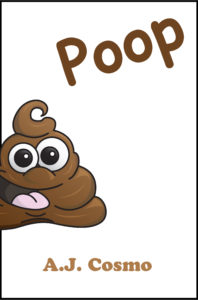“Mature Poop”
In my middle-grade novel Poop (don’t giggle), the main character’s journey is one of finding his maturity. He goes from a ten year old boy who believes that the world is out to get him to realizing that not only is the world indifferent to him, it requires him to take action. Liam’s development is in contrast to his estranged father who is an example that age and maturity are not necessarily correlated. But what exactly is maturity? It’s an abstract concept worth an hour of class discussion. With that in mind, here is how maturity is presented in Poop along with some questions to get the conversation going. (Once the giggling dies down that is.)
Maturity is your view of the world
One of the ways we can assess our maturity is through our view of the world. Do we consider ourselves to be the center of the universe? If so, then we are immature. Likewise, understanding that the world is neither for or against us is a hallmark of a mature personality. Ask your students how important they think they are to their inner circle and to the world at large.
Maturity is putting the needs of others in front of your own
Parents are by default considered mature because they are responsible for the well being of their children. We recognize that taking care of other people, especially when it takes something away from yourself, is an earmark of maturity. It’s remarkable when this trait for charity develops without the presence of children though. Ask your students for examples of times where they put the needs of someone else before their own.
Maturity is doing what you fear
It’s no secret that life often puts the thing you fear most directly in your path. Overcoming your fears and pressing on, in acceptance of being scared, is another sign of maturity. Think of the heroes that we praise for doing the right thing when everyone else was too scared to act. This can be anything from a fear of public speaking to a fear of walking alone at night. A mature person knows that they have the tools to face what is uncomfortable. Ask your students to share a time when they overcame their fears.
Maturity is owning up to your faults
Ask a toddler to admit something they did wrong and what do you get? Without fail, they will give you excuses and distractions. Being able fess up to your own mistakes is a huge part of maturity. No one is perfect, yet we all seem to want to project that we cannot make mistakes. Perhaps it’s a fear of punishment, or maybe it comes from pride, but we have all diverted the truth at some point. Ask your students about a mistake that they made and then lied about. Then ask them what happened and if they eventually had to confess.
Maturity is constant improvement
Growing up means knowing your flaws and being open to correction and improvement. A mature adult knows that growth and change is a constant part of life and works with it rather than against it. Ask any great artist and they will tell you that they still aren’t as good as what they wished they could be. The best athletes never stop practicing and the greatest minds never stop thinking. There is no stopping point and that’s the point of being an adult. Ask your students what they need to work on.
Maturity is trying again after failure
Fear of failure cripples far too many people, which is ironic, because young children never seem to care if they fall down. Being a mature person also means not avoiding failure. Sure, you may have to take care of a scraped knee, but maturity means accepting that failure is a part of growth and experience. Avoiding failure, by being a perfectionist, is actually a refusal to engage with life. After all, many of the great achievements of mankind came only after significant failure (just look up the story of inventing the jet engine.) Ask your students about a time they learned from their own failures.
More questions for your students:
What other traits do you imagine a mature person possesses?
Why is maturity important?
What could you do today to act more mature?
Though it’s an abstract concept, maturity carries with it enough identifiers to allow us to measure ourselves against our own potential. I hope that this has given your students a lot to think about and discuss and, hopefully, reminded a few adults about their own life choices as well. The great irony in creating a middle-grade novel called Poop is that everyone automatically assumes that I am both immature and witless, however, that couldn’t be further from the truth. Just like how Liam learns important life lessons from a talking pile of you know what, it’s oftentimes the most juvenile aspects of life that provide the greatest opportunities for maturity to blossom.
You’re now free to giggle.
Poop
Author: A.J. Cosmo
Published September 12th, 2016 by Thought Bubble Publishing
Summary: Poor Liam. On the very first day of fifth grade, in a strange new town, and a large new school, he interrupts everyone to bolt out and into the girl’s bathroom. There, down in the far stall, in pain from a horrible stomach condition, he meets a new friend: Poop. The cheery little guy says he’s there to help Liam through a tough time in his life. But what does Liam need help with? And who, in their right mind, would want Poop for a friend?
About the Author: A.J. Cosmo is the writer and illustrator of over thirty children’s books including the best selling The Monster That Ate My Socks and I Don’t Want to Go to School. Poop is available online or by asking your local bookstore. Say hi on twitter @ajcosmokids or at www.ajcosmo.com
Thank you A.J. for this post! Maturity is something that is always a necessary conversation in middle school! Also, thank you to Chris from Thought Bubble Publishing for getting us in touch with A.J.




Thank you, Kellee and Ricki for allowing me to share my work and viewpoint on your site! If anyone has any questions I’m here to help!
Thank YOU A.J. for being part of the Unleashing Readers family 🙂